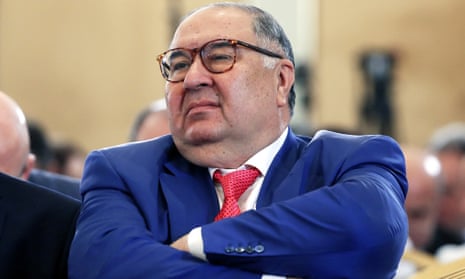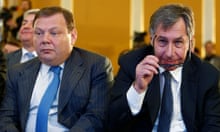Everton Football Club was funded by the oligarch Alisher Usmanov while he was barred from entering the UK, the Guardian can reveal.
The tycoon was told in a letter from the Home Office in September 2021 that his presence in the UK was “not deemed conducive to the public good”.
That ban, which the letter said was “personally directed” by the then home secretary, Priti Patel, came six months before the businessman was sanctioned in the wake of Russia’s invasion of Ukraine.
The existence of his travel ban was known by Everton’s board – but not publicly until now – and raises further questions about whether English football’s due diligence processes are fit for purpose.
At the time of the letter his 26-year-old nephew, Sarvar Ismailov, was serving on the Everton board and Usmanov’s companies had active contracts that were injecting tens of millions into the Merseyside club via a series of sponsorship agreements.
These included naming rights deals for the club’s training ground, initially signed in January 2017, plus another for Everton’s planned new stadium, announced in January 2020, as well as a sponsorship of Everton women’s team.
The exclusion document, which has been seen by the Guardian, reveals for the first time how Usmanov was considered to be “undesirable” by the UK government six months before his alleged links to Vladimir Putin’s regime led to him being placed on sanctions lists by the UK, the EU and the US.
Non-conducive to the public good means that “it is undesirable to admit the person to the UK, based on their character, conduct, or associations because they pose a threat to UK society”, according to published Home Office guidance. The Home Office letter gave no further detail behind the move.
After being barred from the country by the Home Office, Usmanov was then publicly sanctioned by the UK Foreign Office in March 2022 as part of the west’s crackdown on Putin-connected oligarchs in response to Russia invading Ukraine.
At the time, Usmanov described the Foreign Office sanctions citation as “false and defamatory allegations damaging my honour, dignity and business reputation”, and vowed to fight it.
However, he declined to comment on the Home Office letter, which stated the UK government had acted “after the most careful consideration”.
A Home Office spokesperson said: “We do not routinely comment on individual cases.”
The Foreign Office sanctions on Usmanov in 2022 enhanced the restrictions on the businessman in the UK by freezing some of his assets – including Beechwood House in Highgate, north London, worth an estimated £48m, and the 16th-century Sutton Place estate in Surrey. The March 2022 sanctions also made it a crime in the UK to trade with Usmanov.
Only after the the EU announced its sanctions on Usmanov did Everton say it would sever all connections with the oligarch’s companies – although it is understood that the club’s position is that it had no legal obligation to cancel the sponsorship deals in 2021 or 2022 and that it had not breached any Premier League rule.
The revelation of Usmanov’s exclusion heaps further scrutiny on one of England’s most storied football clubs, after the Guardian disclosed in January how a series of football managers had raised questions over Everton’s ownership following claims they were interviewed for the top job in the presence of Usmanov.
Usmanov – as well as his long-term business associate and current Everton owner, Farhad Moshiri – have always denied that the Russian tycoon secretly owned the club. Moshiri’s spokesperson has previously said: “Mr Usmanov has never interviewed or been present during an interview.”
after newsletter promotion
The pair previously owned a joint shareholding in Arsenal, with Moshiri selling his stake to Usmanov in 2016 to buy an initial holding of almost 50% in Everton.
However, records in the Paradise Papers leak suggest Moshiri’s original Arsenal shareholding was funded by a “gift” from Usmanov, which questions whether the 69-year-old Russian oligarch’s funds first bought Everton shares. Moshiri, 67, who is a British national, has always insisted the leaked information is wrong and it was his money that made the investment. He has since increased his Everton stake to 94%.
The Foreign Office sanction announcement in March 2022 also stated that Usmanov had had “significant interests in English football clubs Arsenal and Everton”. The restrictions were enhanced earlier this month, with a further sanctions announcement targeting alleged Usmanov enablers and companies.
News of Usmanov’s 2021 Home Office ban raises fresh questions about whether English football’s due diligence processes are fit for purpose – at a time when Everton is languishing in the relegation zone of the Premier League and searching for much-needed investment, while the governance of the national game is receiving increased attention.
The May 2022 Queen’s speech confirmed that the government would publish proposals to establish an independent regulator for English football (IREF), with promises of a strengthened owners and directors test to protect clubs and their fans.
As well as being funded by a businessman who was barred from the UK, Everton has been struggling for more than three years to raise the finance to complete the building of its new stadium at Bramley-Moore Dock.
The club has also received about £150m in loans from an opaque lender called Rights & Media Funding Limited (RMFL), a Cheshire-based company its lawyers said last year competed “with some of the largest names in sports financing”, although it does not possess a single employee, a website or a phone number.
As the Guardian reported in November, RMFL also appears to have borrowed much of its money from a company based in the offshore secrecy jurisdiction of the Bahamas, which started lending to RMFL just six months after the offshore firm was established and does not reveal its source of funds.
Neither Everton nor Moshiri provided an on-the-record comment.










